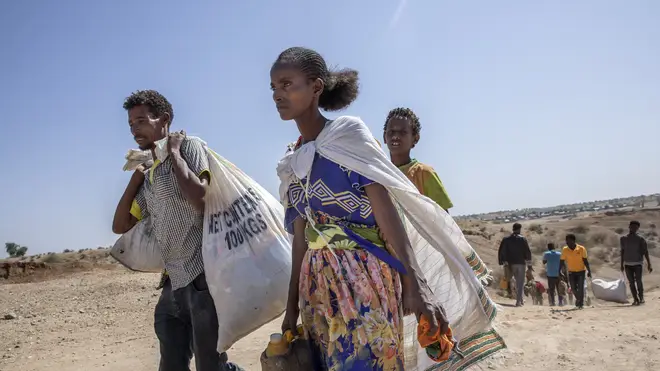
Tonight with Andrew Marr 6pm - 7pm
24 November 2020, 13:14

Ethiopian prime minister Abiy Ahmed has warned the military will launch an offensive on the Tigray region if its leaders do not surrender.
Alarm has spiralled over Ethiopia’s imminent tank attack on the capital of the Tigray region, with the United Nations among organisations warning of the “grave danger” faced by civilians.
Prime minister Abiy Ahmed’s 72-hour ultimatum for the region’s leaders to surrender ends on Wednesday.
His military has warned civilians there will be “no mercy” if they don’t move away from the leaders in time – which some human rights groups and diplomats say could violate international law.

Michelle Bachelet, UN high commissioner for human rights, said: “The highly aggressive rhetoric on both sides regarding the fight for (Tigray capital) Mekele is dangerously provocative and risks placing already vulnerable and frightened civilians in grave danger.”
She added that the allegation that Tigray leaders were hiding among civilians “does not then give the Ethiopian state carte blanche to respond with the use of artillery in densely populated areas”.
A year before taking power in Ethiopia and introducing reforms to win the Nobel Peace Prize, Mr Abiy successfully defended a PhD thesis in conflict resolution. Now he sits in Africa’s diplomatic capital and rejects calls for dialogue.
Meanwhile, a powerful voice in efforts for dialogue, the United States, is in disarray as the Trump administration remains focused on internal politics after losing the November election.
The diplomatic vacuum has brought Ethiopia, one of Africa’s most powerful and populous countries, to what Amnesty International calls “the brink of a deadly escalation” at the heart of the strategic Horn of Africa.

With time running out before the assault on Mekele and its population of some half-million people, the UN Security Council is reportedly meeting to discuss the situation.
However, efforts by the UN secretary-general, the African Union, the European Union and others have been turned aside.
In an unusually public disagreement over the weekend, the current AU chair, South African president Cyril Ramaphosa, backed three high-level envoys for Ethiopia. Although the UN chief praised the initiative for “efforts to peacefully resolve the conflict”, Ethiopia said the envoys would meet with Mr Abiy and not with the Tigray leaders.
The snub comes as Ethiopian government continues to insist that the leaders of the Tigray People’s Liberation Front (TPLF) are criminals.
On Monday, Redwan Hussein, spokesman for the government’s task force on Tigray, told reporters: “All possible scenarios will be on the table to talk – except bringing the gang to the table as a legitimate entity.”
The heavily armed TPLF dominated Ethiopia’s government for more than a 25 years. It was side-lined after Mr Abiy took office in 2018 and sought to centralise power in a country long ruled along ethnic lines.

The TPLF infuriated Mr Abiy’s government by holding an election in September despite national elections being postponed due to the pandemic. The party argues that Mr Abiy’s mandate has expired.
Each side now regards the other as illegal. Meanwhile, hundreds if not thousands of people have been killed, nearly 40,000 people have fled into Sudan and the UN says two million people in the sealed-off Tigray region urgently need help as food and medical supplies run out.
With the crisis exploding, some were dismayed to hear the top US diplomat for Africa, Tibor Nagy, repeat Washington’s stance that the TPLF was to blame for seeking to depose Mr Abiy.
Yet, he added that the US had little information from inside the Tigray region with communications largely severed.
The US stance is notably different from other high-profile pleas for dialogue, which urge both sides for an immediate de-escalation without assigning blame.
Mr Nagy told reporters last week: “Mediation: I think it’s very important to underscore. It’s a tactic, it’s a way to get to the goal. It’s not a goal in itself. I mean, our goal is a quick end to the conflict.

The US ambassador to Ethiopia, Michael Raynor, added that in his discussions with Mr Abiy and the Tigray leader, Debretsion Gebremichael, there was a “strong commitment on both sides to see the military conflict through”.
Nearly 20 US senators have urged secretary of state Mike Pompeo to engage Mr Abiy directly before it’s too late.
Bob Menendez, US senator from New Jersey, said: “(Ethiopia) has a once-in-a-generation opportunity that we must not let slip away.”
Without quick action, he warned that “bloody and protracted conflict is unavoidable”.
Cameron Hudson, a senior fellow at the Atlantic Council think tank, said the US idea that mediation is not the goal is “flabbergasting”.
He said: “When you’re making absolutely no headway, then you have to have incremental steps, progress. If mediation is an incremental step on the way to peace, then it needs to be the principal aim.”

Mr Hudson said it seems the state department is trying to restore US credibility with Mr Abiy after President Trump did “significant damage” with a campaign to punish Ethiopia for its stance in a dispute with Egypt on building a massive dam on the Blue Nile.
In a rare intervention on an African issue, Mr Trump told the state department to suspend millions of dollars of aid to Ethiopia and asserted that Egypt would “blow up” the dam.
Now there are signs that others in the Trump administration are pushing for dialogue. The National Security Council overnight tweeted: “The United States calls for mediation in Ethiopia and supports the efforts led by Cyril Ramaphosa and the African Union to end this tragic conflict now.”
President-elect Joe Biden’s nominee for secretary of state, Antony Blinken, said last week: “The TPLF and Ethiopian authorities should take urgent steps to end the conflict.”
His office said he was not available to comment.